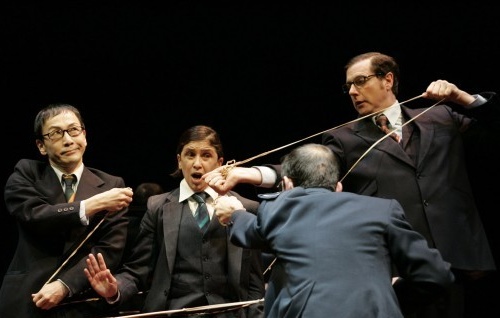
When Ido suddenly finds his family held hostage by an escaped murderer, rather than embrace the role of the victim, he takes a slightly more unusual attitude toward the situation. Hideki Noda and Colin Teevan’s play examines the idea of the victim deciding not to be the victim.
Miriam Buether’s set is a contemporary, oriental apartment, with a semi-transparent mirror back drop, allowing the space to seem bigger, as well as creating a secondary space behind the main stage, which can be made visible/shielded from the audience at any time. Thematically the colour orange dominates the stage. Determination and warning are common connotations of this colour, so we are aptly set on edge before the actors have even graced the stage.
As the performers hit the set it explodes with energy. They are sharp, smooth and work in perfect harmony with each other. The props in this production are used without any creative limitation. We can believe that a roll of paper is a small child, a plush rug, or indeed, a roll of paper. The changing of the props’ meanings is so swift and convincing that it almost slips our perception.
The company has chosen to swap the genders of two of the main characters, Mr. Ido is played by Kathryn Hunter, while Ogoro’s Wife is played by Hideki Noda, which is not only done in a physically and emotionally convincing manner, but also fits in perfectly with the general theme of reflection which preponderates the whole production.
Choosing not to become a victim leads Mr Ido to instead, become the criminal. They effectively swap roles. The reflective backdrop, besides adding physical depth to the piece, also forces the audience to look at its own reflection, almost swapping the positions of the actors and the audience. This is an extremely interesting idea, which is drummed heavily into the piece, portraying Noda and Teevan’s idea of viewing situations from the alternative perspective very clearly.
to watch both these actors , is to truly believe in every emotion they are feeling
Hunter’s performance as Ido is strong, clear and confident. She emasculates herself with such grounding that you could be forgiven for actually believing she was a man. The same, or indeed opposite, can be said for Noda as Ogoro’s wife. His portrayal is beautiful. He is physically engrossed in the character, and to watch both these actors , is to truly believe in every emotion they are feeling.
Glyn Pritchard and Clive Mendus are diverse, playing several different characters. Pritchard’s shifts between Ogoro and Ogoro’s son are seemless, yet polar. Both Mendus and Pritchard have good comedic timing. There is no weak link in this cast.
Noda’s influence in the piece is mammouth. Co-writing, directing and performing in such an intriguing piece of theatre with utter gusto, can surely only come from genuine enthusiasm, which shows itself in every aspect of the production.
This play is a sensational example of how Epic Theatre, and Theatre of the Absurd can inspire emotion in its audience. It is fast-paced and lively without being afraid to be calm and delicate where necessary.
***** (5 stars)
Runs until 11 February
More info



Be the first to comment